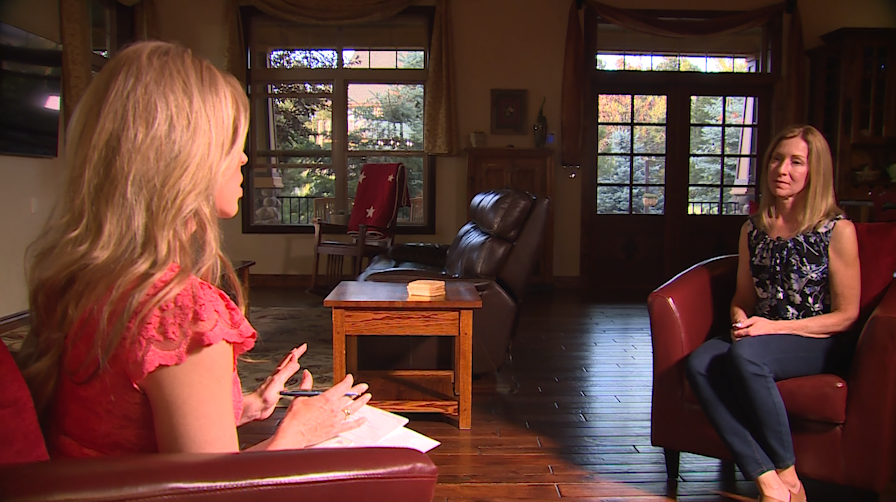Colorado children sent out of state; lack of behavioral group homes to blame
MONUMENT, Colo. (KRDO) -- Families with children suffering from severe autism are begging the state of Colorado for help.
Some are waiting months -- even years -- for their child, who might be displaying aggressive behaviors, to be placed in a residential therapeutic home.
"We've had a couple TVs that have been destroyed. Glass shattered. Fans destroyed. Christmas decorations decimated, all kinds of behaviors," said Jodi Coyne, who's been waiting nearly a year for placement for her son who was diagnosed with autism at age four.
She describes her now-teen as funny and sweet, athletic, and with the capacity to be loving -- but who struggles to regulate himself. Often, his outbursts bubble up, without warning.

She and her husband have found ways of coping -- but being in crisis long-term brings the mother of two to the verge of tears. Dozens of holes in their walls are covered with construction paper; the family now waiting to fix them permanently.
"We try our best to catch it before it gets escalated, so we do have some skills we can apply: helping him breathe, talking him through it," said Coyne. "[But] when the testosterone hits the autism, it can be very hard to manage."
Indeed, Colorado's Behavioral Health system is in crisis: 14 children dealing with complex behavioral issues have been sent out of state because Colorado doesn't have the resources to house and treat them. The state couldn't provide the number of those with intellectual and developmental delays who have been sent out of state, that are recorded in their database.
Twenty-five additional children are currently waiting to be placed in residential facilities; four of those have intellectual and developmental delays.
The Department of Human Services oversees residential placement for children -- 3,662 in 2022 -- which encompasses those in the foster care system, those in mental health crises, those who've stepped down from Division of Youth Services facilities to include sex or gun offenses, and those diagnosed with intellectual and developmental delays.
The needs are complex and there is no one-size-fits-all treatment plan.
In its own assessment, CDHS writes,
"The population of children and youth served in residential facilities has shifted dramatically, resulting in a smaller population but one that requires more intensive staffing, treatment, and care coordination."
Colorado Department of Human Services
It was in 2022 that the Colorado General Assembly green-lit $35 million in construction and $17.6 million for the operation of a 16-bed neuro-psych facility for adolescents. But, it won't be operational until January 2025.
"I believe that those families need somewhere to turn as quickly as they can," said Rep. Mary Young (D) from Weld County, who was instrumental in drafting that eventual legislation. "Having placements for the children that need them as quickly as possible is certainly on my wish list."
But, it's not just housing for those with complex needs; funding is also lagging for the Behavioral Health Administration, which oversees day treatment programs. Staffing for those programs lags, causing many workers to leave or entire programs to pull out of the state.
"That whole continuum that goes from in-home services to day treatment services, to residential services all need some investment at this time," said Minna Costilla Cohen, the Director of the Office of Children, Youth and Families at Colorado Department of Human Services.
"I think Colorado is at a critical juncture. We need to make those critical investments in our full continuum of behavioral healthcare system so that every child has access to the treatment services that they need," said Costilla Cohen. "We are working together with the Governor's Office on a November budget that will allow for potentially additional resources to come in to allow us to increase that daily provider rate."
The Governor is required by law to submit a budget proposal to the legislature by November. According to a spokesperson with Governor Jared Polis:
"Governor Polis understands that youth with acute behavioral needs is a challenge that must be addressed and looks forward to continued efforts with the legislature and local governments on solutions to this crisis. The Governor is committed to continue working with the legislature and local governments to ensure Colorado’s children have equitable access to high-quality treatment.”
Conor Cahil, Governor Jared Polis Spokesperson
It's a wait that is costing the Coyne family, dearly.
"We love our kids so much, and we want them in our homes. But there comes a point where we can't keep them safe or other siblings safe. The state has allocated millions of dollars for our kids to have these residential programs that are direly needed because we are in absolute crisis -- but it's held up in bureaucracy."
